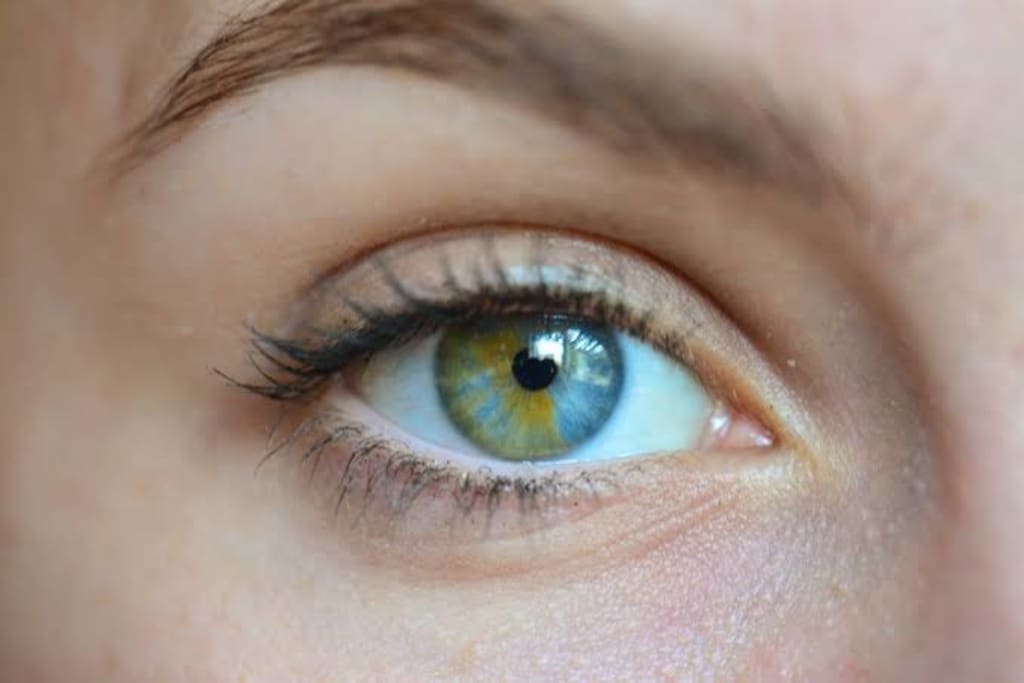
You have a half hazel and half blue eye? What could that mean? Gasp! It's heterochromia!
When I was younger, about 8 or so, I went to a music concert my sister was performing at with my parents. As we were standing out in the lobby, the dazzling (yet oh so bright) chandeliers made it very easy for my parents to notice and point out my multi-colored left eye. This was something I shrugged off because at that age, I really didn't care about much besides cartoons and pizza. That is, until the color change became more drastic. At first it had started out as a tiny sliver of brown, and then over the next couple years it gradually changed to where exactly one half was hazel, the other half remaining blue.
As a Baby
The proper name for the heterochromia that I have is sectoral heterochromia. There are multiple types of heterochromia, and multiple ways that can cause it. It is either acquired at birth, or later on in life. In infancy, it can be caused by "Horner's syndrome, Benign heterochromia, Sturge-Weber syndrome, Waardenburg Syndrome, Piebaldism, Hirschsprung disease, Bloch-Sulzberger syndrome, von Recklinghausen disease, Bourneville disease, and Parry-Romberg syndrome (Turbert)." Usually the heterochromia will be accompanied by other symptoms if it is not benign. rarediseases.info.nih.gov is a great resource if you are wanting to look more into depth on some or all of these conditions.
A s an Adult
When you've acquired heterochromia later on in life, the causes are different than when you were an infant. Those include: "eye injury , bleeding in the eye , swelling due to iritis or uveitis , eye surgery , Fuchs' heterochromic cyclitis , acquired Horner’s syndrome , glaucoma and some medications used to treat it , Latisse, a repurposed glaucoma medication used cosmetically to thicken eyelashes , pigment dispersion syndrome , ocular melanosis , Posner-Schlossman syndrome , iris ectropion syndrome , benign and malignant tumors of the iris , diabetes mellitus , central retinal vein occlusion , Chediak-Higashi syndrome" (Turbert). Whew! That sure is a lot isn't it? Now if I had the time to analyze every single one of these and explain them, I would. Alas, I do not have that time. Fortunately, information on most of these can be found at rarediseases.info.nih.gov.
How Rare is It?
According to webmd.com, "Heterochromia is common in some animals but rare in humans. It affects fewer than 200,000 people in the United States" (insert source here). That is less than one percent of the nation's population.
Can it Be Inherited?
Although it is more rare in humans for it to be inherited, it is possible for it to be passed down genetically. Animals however inherit heterochromia much more frequently.
Some Celebrities That Have Heterochromia
- Mila Kunis
- Jane Seymour
- Alice Eve
- Olivia Wilde
- Demi Moore
- Dominic Sherwood
- Benedict Cumberbatch
(List of celebrities obtained from https://www.savoirflair.com/beauty/507678/celebrities-with-heterochromia)
In Conclusion
Heterochromia is a pretty neat condition where one or both eyes can differ in color. Majority of the time it is not a cause for concern unless it is accompanied by other symptoms. It can be acquired at infancy or into adulthood, and affects less than one percent of the human population. It is a pretty cool thing to show off if you have it!
Sources Used
CMAJ/JMAC Canadian Medical Association Journal: "Heterochromia."
Turbert, David. “Heterochromia.” American Academy of Ophthalmology, 5 Jan. 2018, www.aao.org/eye-health/diseases/what-is-heterochromia.
About the Creator
Grace Linn
Just your neighborhood friendly nerd






Comments
There are no comments for this story
Be the first to respond and start the conversation.